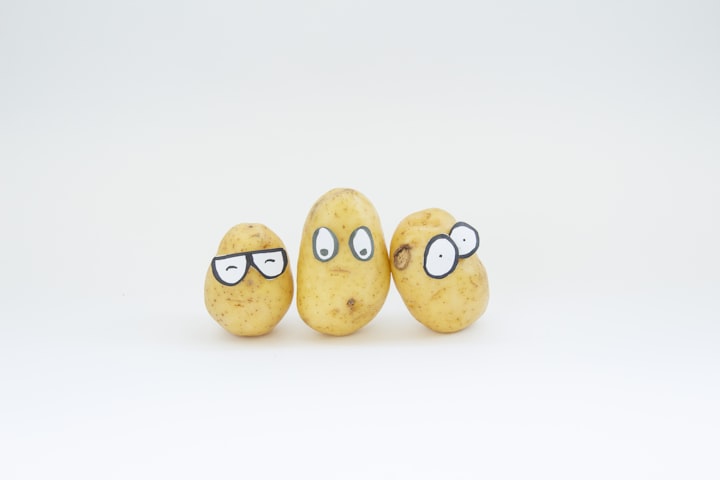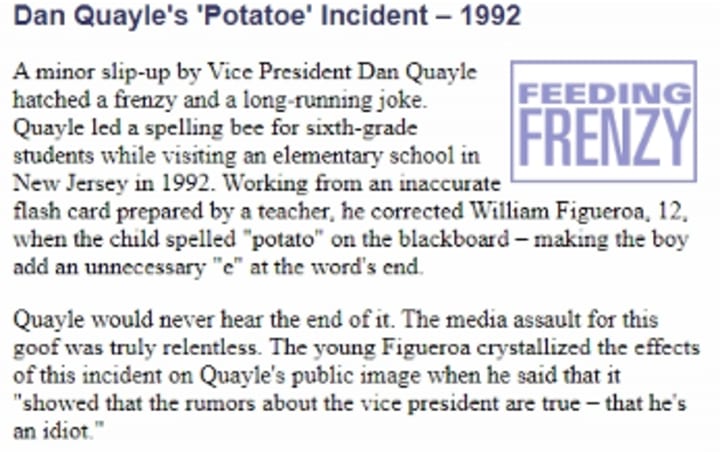
Nobody wants to be called a potato head, not even Vice President Dan Quayle. I remember how relentless the media coverage was when Dan Quayle altered a young boy's spelling of the word potato on national TV.
With that simple spelling mistake, he lost his chance to become the next US president. Imagine how low the standards of the Republican party were in 2016 when they chose Donald Trump to be their standard-bearer, and as they all say, the rest is history.
But it wasn't only the potato gaffe that did it for Dan Quayle. It was also his attack against unmarried women who chose to have children without a father.
And he happened to wage that war against a fictional TV character, Murphy Brown. If that isn't being a potato head, I don't know what is.
It doesn’t help matters when primetime TV has Murphy Brown, a character who supposedly epitomizes today’s intelligent, highly paid professional woman, mocking the importance of fathers by bearing a child alone and calling it just another lifestyle choice.

In 1992, Bush and Quayle lost their reelection bid, and there were far more people who watched the season finale of Murphy Brown than those who voted for them.
Today, I read a tweet about potatoes, and one thing I didn't know until now is that potato wasn't a food choice for westerners until the 17th century.
And it leads me to read an interesting article in The Economist about food, food security, and its future. There was a bit of a trivia on the article — there was a time when Europeans believed that potatoes could cause leprosy.
In 17th-century Europe many people were loth to eat a new vegetable called the potato because it was not mentioned in the Bible, or because they feared it caused leprosy.
There is a lot of food information here that I never really bothered to explore. The history behind food, partly because, like many, I have taken food for granted.
We assumed it had always been there.
The potato was originally grown in what is now Peru by the Incas and other native South Americans.
We all know how food is the easiest way to learn about other peoples' cultures and even make friends when traveling.
But in the past, food could also be the commodity to make people remain poor, like what happened in Ireland in the 18th century.
With potatoes being cheap, capitalists were able to pay their workers low wages throughout the Industrial revolution.
The relatively inexpensive and large production of potatoes created an opportunity for business owners to create an oppressive cycle from which it was difficult for workers to break.
The manufacturing industry could afford to feed its workers cheap, nutritional food, while maintaining low wages in order to create a product with a very low wholesale price and a very high-profit markup.
But while potatoes sustained populations by providing nutrition, it also became the reason for the Irish Potato Famine, which killed a million people in Ireland.
A single fungus is known as Phytophthora infestans (or P. infestans) infected the potato plant until it almost killed all the potatoes in Ireland and caused famine and poverty.
Does that sound familiar?
The power of one food or the lack of it can wipe out population is a sad reminder of how we can never win against nature.
Final thoughts.
We have seen billionaires going to space for leisure, which only a few years ago was only a dream, and yet we still live in a world where millions go hungry each day.
At the same time, in most developed countries, food waste could very well feed the homeless and the hungry, the big disconnect of how technology has improved the way we produce food, so much so that we can produce beef in the lab or make plant-based meat.
Yet, we see children still dying from hunger.
The future of our planet is in our hands. Should we adapt to new types of food, the ones made possible by new technology, that are more environmentally friendly, or do, we let people decide what they want to eat regardless of its origin.
It is hard to tell people what to eat and what not to eat. But, that is a choice I still hope will never be dictated by the government or by a catastrophe.
About the Creator
Napoleon
Working to be a better storyteller everyday.






Comments
There are no comments for this story
Be the first to respond and start the conversation.